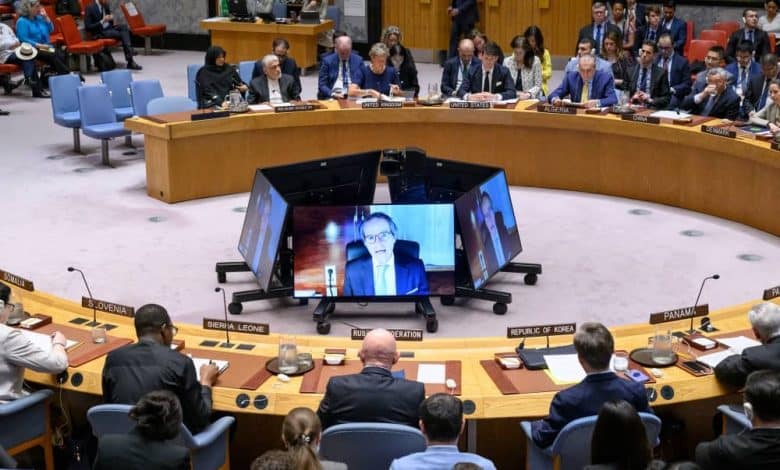The marble halls of the United Nations pulsed with urgency on Friday morning. An emergency meeting of the Security Council had been called in response to Israel’s latest military operation—an aggressive series of airstrikes targeting Iranian Revolutionary Guard Corps facilities near Esfahan and Shiraz. Initial reports suggested dozens killed and significant infrastructural damage. The strikes marked a dramatic escalation in an already volatile Middle East, igniting a swift and divided global response.
In the chamber, where polished language often conceals deep divides, Friday’s meeting laid bare the fracture lines of global power. At the centre stood two increasingly assertive voices: Russia and China, united in denouncing the attacks, opposing what they see as a Western monopoly on global security narratives.
Taking the floor early in the session, Russian Ambassador Vasily Nebenzya delivered a blistering condemnation. His speech was measured but unmistakably forceful.
“What we have witnessed is a flagrant breach of international law and a dangerous provocation,” Nebenzya said, referring to the Israeli strikes. “No state has the right to conduct unilateral military actions on foreign soil without Security Council authorisation, regardless of perceived threats.”
Russia’s position was grounded in long-standing principles of state sovereignty and non-intervention—principles that Moscow argues are selectively upheld by the West. Nebenzya framed the airstrikes as part of a broader pattern of “impunity” granted to Israel, shielded from accountability by its Western allies.
In a closed-door consultation following the public session, Russia reportedly circulated a draft resolution condemning the strikes and calling for an international investigation. Though the resolution had little chance of passage due to likely Western vetoes, it served as a political statement: Moscow intended to lead the resistance against what it sees as Western-engineered instability.
For Russia, the moment offered a dual opportunity: to position itself as a defender of international law—and to rally nations frustrated with the perceived double standards of U.S.-led diplomacy.
China’s Permanent Representative Zhang Jun adopted a more measured, diplomatic tone but echoed similar concerns.
“China is deeply concerned by the escalation,” Zhang stated. “The use of force will not bring security—it will only deepen mistrust and widen the conflict. We call on all parties to exercise maximum restraint and return to dialogue.”
China’s position emphasized dialogue, multilateralism, and regional stability, subtly casting itself as a neutral arbiter in contrast to what it described as the “dangerous indulgence of unilateral militarism.”
Behind the scenes, Beijing was reportedly working on a parallel diplomatic initiative, proposing a four-party mediation framework involving Iran, Israel, the EU, and a neutral bloc of states including Brazil and Indonesia. While the plan had little immediate traction, it signalled China’s intent to frame itself as a peacemaker in contrast to what it perceives as the militarised diplomacy of the United States.
China’s broader aim appeared twofold: to reinforce its image as a responsible global stakeholder and to challenge the narrative that only Western powers can act as guarantors of peace in the Middle East.
The United States and France defended Israel’s actions, framing them as preemptive strikes against an “imminent threat” from Iranian missile installations allegedly being readied for attack.
“Every nation has the right to protect its citizens. Israel acted within that right. The threat posed by Iranian proxies and direct aggression cannot be ignored.”
France’s Ambassador Nicolas de Rivière echoed similar sentiments, though with a more cautious tone, urging for “a pathway back to de-escalation without denying Israel its right to exist in peace.”
Yet, neither country supported a ceasefire resolution proposed by non-aligned states. The split laid bare the enduring impasse in the Security Council, where geopolitical allegiances trumped collective action.
Outside the chamber, protests erupted in Tehran, Beirut, and Ramallah, condemning Israel and criticising Western support. In capitals across Africa, Latin America, and Southeast Asia, governments issued cautious statements, many quietly aligning with the Chinese and Russian position on restraint and sovereignty.
Analysts noted that the emergency session illustrated a broader shift in global diplomacy: the erosion of Western consensus and the rise of multipolar alignments. The Israeli airstrikes may have triggered the meeting, but the real story was the crystallisation of a new international dynamic—one where China and Russia seek not only to check Western power but to redefine the norms of global governance.
By the session’s end, no resolution had been passed. The chamber emptied, the chairs vacated, the microphones silenced. Yet, the echo of division lingered.
For China and Russia, the Israeli airstrikes provided a moment to challenge the moral high ground traditionally claimed by the West. For the United States and its allies, it was a matter of security and deterrence. For the rest of the world, it was another reminder that the very institution tasked with preserving peace remains ensnared in the rivalries it was designed to transcend.
As night fell over New York, the world remained on edge—not just from the missiles, but from the knowledge that the guardians of international peace could no longer speak with one voice.





